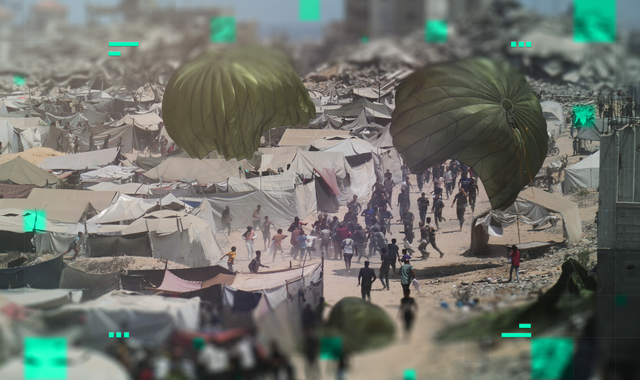
Five days before he was killed by a falling aid package, father-of-two Uday al Qaraan called on world leaders to open Gaza's borders to food - and criticised the use of airdrops.
"This isn't aid delivery," said the 32-year-old medic as a crowd of children rummaged through the remains of an airdrop behind him. "This is humiliation."
Using footage from social media, satellite imagery, eyewitness testimony and flight tracking data, Sky News has examined the dangers posed by airdrops - and just how little difference they are making to Gaza's hunger crisis.
A tangled parachute and a crowd in chaos
Based on six videos of the airdrop that killed Uday, we were able to locate the incident to a tent camp on the coast of central Gaza.
We determined that the drop occurred at approximately 11.50am on 4 August, based on metadata from these videos shared by three eyewitnesses.
Flight tracking data shows that only one aid plane, a UAE Armed Forces C-130 Hercules, was in the area at that time.
Footage from the ground shows 12 pallets falling from the plane. The four lowest parachutes soon become tangled, and begin to fall in pairs.
As a crowd surges towards the landing zone, a gunshot rings out. Nine more follow over a 90-second period.
Sakhr al Qaraan, an eyewitness and Uday's neighbour, says that Uday was among those running after the first pallet to land.
"He didn't see the other pallet it was tangled up with, and it fell on him moments later," says Sakhr.
"People ran to collect the aid in cold blood, devoid of humanity, and he suffocated under that damned blanket - under the feet of people who had lost all humanity."
The scene descended into chaos as Palestinians, some armed, tussled over the limited food available.
By the time Uday was pulled from the crowd and rushed to hospital, it was too late.
The UAE Ministry of Foreign Affairs did not respond to a request for comment.
Parachutes failed in half of airdrops analysed
This was not the first time that airdrops at this location had posed a threat to those on the ground.
The day before Uday was killed, the same plane had dropped aid over the site.
The footage below, shared by the UAE Armed Forces, shows the view from inside the plane. Just before the footage ends, it shows that one of the parachutes was broken.
Hisham al Armi recorded the scene from the ground. His video shows the broken parachute, as well as another that had failed completely.
Military planes dropped aid at the site on eight consecutive days between 30 July and 6 August. Sky News verified footage showing parachute failures during four of those eight airdrops.
Flight tracking data shows that almost all of the 67 aid flights over that period followed a similar route along the coast, which is densely packed with tent camps.
An Israel Defence Forces (IDF) official told Sky News that the airdrops are routed along the coast, because this is where much of Gaza's population is now concentrated.
An IDF spokesperson added the Israeli military "takes all possible measures to mitigate the harm to uninvolved civilians".
Hisham al Armi told Sky News he is grateful to the countries that donated the aid, but "the negatives outweigh the positives".
"Fighting occurs when aid is dropped, and some people are killed ... due to the crush and parachutes."
Other dangers are also posed by the airdrops.
The footage below, taken on 29 July, shows Palestinians venturing into the sea in order to chase aid that had drifted over the water. The IDF has banned Palestinians from entering the sea.
One woman, a relative of Uday who witnessed his death, described the airdrops as the "airborne humiliation of the people".
"There is not enough aid for them," she said. "It creates problems among the people, and some are killed just to obtain a little aid. And most people don't receive any aid, they remain hungry for days."
Between 27 July and 1 August, Gaza received an estimated 1,505 tonnes of food aid per day via land routes - 533 tonnes short of what the UN's food security agency says is needed to meet basic needs.
Based on flight tracking data, we estimated that airdrops added just 38 tonnes daily, 7% of the shortfall.
"The quantities involved are minuscule in terms of the scale of the need," says Sam Rose, Gaza director of UNRWA, the UN agency previously responsible for distributing food in the territory.
UNRWA claims it has enough food stationed outside of Gaza to feed the population for three months, but that Israel has not allowed the agency to bring in any food since 2 March.
"We should be dealing with that rather than introducing something else which is costly, dangerous, undignified and somehow legitimises ... the access regime by suggesting that we found a way round it through airdrops," Rose says.
COGAT, the Israeli agency responsible for coordinating aid deliveries, referred Sky News to a statement in which it said there is "no limit on the amount of aid" allowed into Gaza.
An IDF spokesperson also denied restricting aid, and said the Israeli military "will continue to work in order to improve the humanitarian response in the Gaza Strip, along with the international community".
In his interview five days before he was killed, Uday al Qaraan appealed to world leaders to open Gaza's borders.
"What would happen if they just let the aid in?" he asked. "If you can fly planes and drop aid from the sky then you can break the siege, you can open a land crossing."
The Data and Forensics team is a multi-skilled unit dedicated to providing transparent journalism from Sky News. We gather, analyse and visualise data to tell data-driven stories. We combine traditional reporting skills with advanced analysis of satellite images, social media and other open source information. Through multimedia storytelling we aim to better explain the world while also showing how our journalism is done.

(c) Sky News 2025: A father criticised the use of airdrops in Gaza. Five days later, he was killed by a falling pallet



 More than 50 arrests at protest in support of proscribed group Palestine Action
More than 50 arrests at protest in support of proscribed group Palestine Action
 Lifting sanctions on Putin for Trump meeting is a massive victory for Moscow
Lifting sanctions on Putin for Trump meeting is a massive victory for Moscow
 Second arrest after man found dead on bench near Northampton canal
Second arrest after man found dead on bench near Northampton canal
 Wembley investigating claims people were smuggled into Oasis gig without tickets
Wembley investigating claims people were smuggled into Oasis gig without tickets
 DWP handling of prosecutions of Post Office staff to be examined in independent review
DWP handling of prosecutions of Post Office staff to be examined in independent review